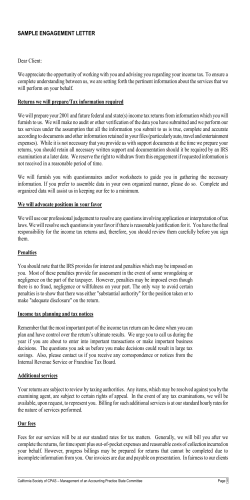
This Explanatory Memorandum has been prepared by the Welsh Government
Explanatory Memorandum to the Local Government Byelaws (Fixed Penalties) (Wales) Regulations 2014 This Explanatory Memorandum has been prepared by the Welsh Government Local Government Department and is laid before the National Assembly for Wales in conjunction with the above subordinate legislation and in accordance with Standing Order 27.1 Minister’s Declaration In my view, this Explanatory Memorandum gives a fair and reasonable view of the expected impact of the Local Government Byelaws (Fixed Penalties) (Wales) Regulations 2014. I am satisfied the benefits outweigh any costs. Leighton Andrew AM Minister for Public Services 9 October 2014 1 1. Description These Regulations relate to fixed penalties which may be used as an enforcement mechanism for offences against certain byelaws and stipulate the range within which the amount payable may be set. 2. Matters of special interest to the Constitutional and Legislative Affairs Committee None. 3. Legislative background The powers enabling this instrument to be made are contained in section 13 (3) and (4) of the Local Government Byelaws (Wales) Act 2012 (“the Act”). Section 13 (1) makes provision for a legislating authority to specify the amount of a fixed penalty payable in respect of a breach of byelaws. Section 13 (3) and (4) confers on the Welsh Ministers the power to make regulations specifying a range within which the amount of fixed penalty specified by a legislating authority must fall. The legislating authorities to whom the Act relates are councils for counties or county boroughs in Wales; community councils; National Park authorities in Wales; and the Countryside Council for Wales1. These Regulations will follow the Negative Procedure. 4. Purpose & intended effect of the legislation The purpose of the instrument is to set a range within which legislating authorities may set the level of fixed penalty for breaching byelaws made under enactments specified in Part 2 of Schedule 1 to the Act. The range within which the amount to be paid would be set under the instrument is consistent with equivalent provision for fixed penalty notices (“FPNs”) made under powers in the Clean Neighbourhoods and Environment Act 2005. It is considered to be affordable for likely offenders against byelaws yet also a measure which can help to change their behaviour. 5. Consultation Consultation with local government on the proposed Bill as a whole took place (21 June 2010 to 17 September 2010) to sound out views on proposals to simplify the confirmation process as well as the use of fixed penalties for enforcement. The majority of respondents were in favour of 1 It is intended to amend the Act separately to substitute references to Natural Resources Wales for references to the Countryside Council for Wales. 2 the proposals. A report on the responses may be found on the Welsh Government archive website. http://www.webarchive.org.uk/wayback/archive/20110228135938/http://wal es.gov.uk/consultations/localgovernment/byelaws/?lang=en&status=closed Consultation specifically on the draft regulations took place from 17 February to 11 May 2014 together with consultation on another statutory instrument proposed to be made under the Act and on draft statutory guidance. Details of this consultation and summary response may be viewed on the link below: http://wales.gov.uk/consultations/localgovernment/140213-local-government-byelawsconsultation/?status=closed&lang=en PART 2 – REGULATORY IMPACT ASSESSMENT Options Purpose and intended effect of the legislation Option 1 - Do nothing Unless the regulation-making power is exercised, it would be for the legislating authorities to decide the amount to specify as a fixed penalty. This could lead to a wide disparity of amounts charged in different authority areas for the same or similar offences. It is very important the level for a fixed penalty is appropriate to the offence. Fixed penalties which are perceived to be too high by the offender or by the community will be counter productive and may remain unpaid or end up in the magistrates’ courts. The “do nothing” option would mean fixed penalties may not deliver the benefits of providing an effective and visible means of enforcement as intended by the Act. Option 2 - Do minimum Provide a single fixed amount but not a range. This would mean all fixed penalties would be identical. This would not allow legislating authorities to set amounts proportionate to the severity of the offence. Option 3 - Introduce the regulations The regulations stipulate the range within which fixed penalties may be set. This would provide legislating authorities with a range within which fixed penalties may be set but also with flexibility to vary the charge within the range according to their appreciation of local needs. The regulations prescribe a range of £50 to £150 inclusive. 3 Since the introduction of FPNs, there has been a suspicion in the community around legislating authorities using this type of enforcement as a means to raise additional revenue. This suspicion is especially common in the current period of austerity and local authority funding cuts. Stipulating the range of charges by legislation would help to reduce this perception. Costs & benefits Costs and benefits – Option 1 do nothing If the Regulations were not made, legislating authorities would need to decide on the level of fixed penalties themselves. This would involve administrative time in reviewing cost structures. If they were to set the penalties too high, they might also have to bear the costs of chasing payments and in some cases even taking the offenders to court. If they were to set the penalties too low, the penalties might not be seen as a deterrent by potential offenders and so become counter productive. Cost and benefits – Option 2 do minimum Using a fixed amount would reduce administrative costs in setting fixed penalties. However, because it does not provide flexibility in addressing differing levels and severity of offences, it could mean policy objectives were not met. This means this option may prove not to be cost effective. Cost and benefits – Option 3 introduce regulations There may be administrative costs in initially setting fixed penalty amounts within the prescribed range for each byelaw offence. It has been estimated any additional costs in introducing FPNs would be in the region of £500 per authority since most authorities already have arrangements for enforcement due to implementing the Clean Neighbourhoods and Environment Act 2005. Setting appropriate penalties would be a small proportion of this cost. It may take time and require reflection upon experience of operating the fixed penalty regime to set the amounts at the optimum levels so in the meantime there may be costs involved if notices are not paid and legislating authorities have to chase. Further costs may be incurred if it is decided to pursue unpaid fines in the magistrates’ courts. However, in the longer term, fixed penalty notices have been proven to be both an efficient method of enforcement for many minor offences and an effective means of changing behaviour. The Clean Neighbourhoods and Environment Act 2005 has shown many authorities are demonstrating responsibility in using the powers correctly and proportionately. The Regulations will help to ensure amounts are set at levels appropriate to the offence. By this means fixed penalties will provide a direct means of enforcement whilst relieving pressure on the magistrates’ courts. 4 The Act also stipulates authorities should have regard to the desirability of using fixed penalty receipts to combat nuisances for the prevention of which an authority made a byelaw. The collection of funds from fines is not to be seen as a revenue generating opportunity but rather as an effective way of changing behaviour and the monies generated can be used to improve the intervention. Summary of preferred option The preferred option is Option 3. In summary, this option allows legislating authorities to set their fixed penalties within a range prescribed by the Welsh Ministers. This means legislating authorities have more discretion and flexibility when setting penalties than they would have on the standard scale for setting fines. The benefits of Option 3 are expected to be: Penalties which are proportionate to the offence, which means they are more likely to be accepted by the offender and change behaviour effectively. A potential release of Magistrates’ courts time A range set by a single external body i.e. the Welsh Ministers which means it applies to all legislating authorities and may only be changed through amended legislation. Consultation This RIA was sent out for consultation together with guidance for the Act and the draft regulations and order during 17 February to 11 May 2014. There were no responses which contributed to the cost benefit analysis presented in the document. The summary response may be viewed at: http://wales.gov.uk/consultations/localgovernment/140213-local-government-byelawsconsultation/?status=closed&lang=en Cross reference Please note this EM/RIA accompanies the EM/RIA for the Local Government Byelaws (Wales) Act 2012 (Amendment) Order 2014. Competition Assessment A competition filter test has been applied to the Regulations. The result of the test suggests there is unlikely to be any detrimental or beneficial effects on competition. Legislating authorities will have increased ownership over the byelaw making process with the removal for the need for confirmation by the Welsh Ministers. The Act also makes consultation on proposals by legislating authorities to introduce byelaws a statutory requirement. Authorities will be required to 5 consult the public, business, and the third sector during the initial decision making process during which a byelaw is identified to be the most appropriate means of addressing a problem. Authorities will also need to advertise the byelaw once it is made and before it is finalised.The public, business and third sector could also be affected by an enforcement regime which includes FPNs. Post implementation review The Welsh Government will monitor the impact of the regulation making process through feedback from legislating authorities and other stakeholders. 6
© Copyright 2025










